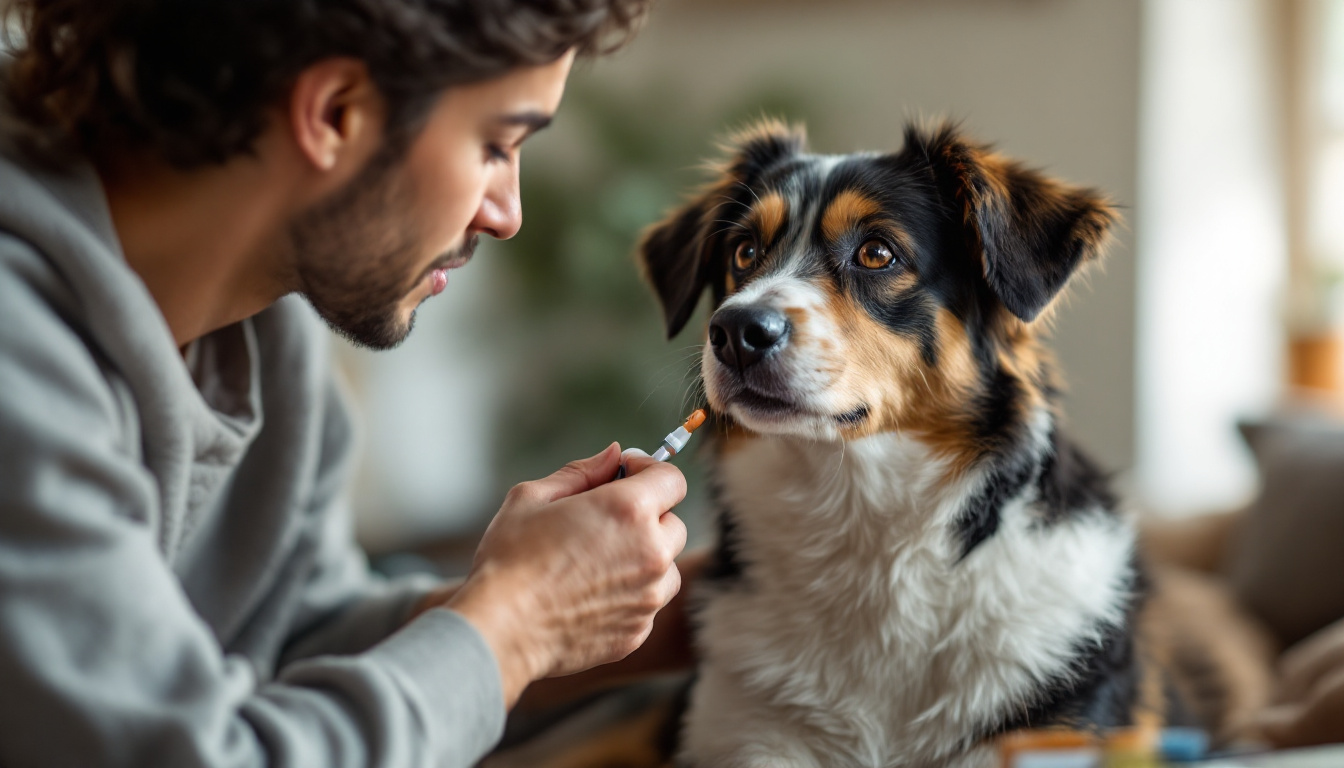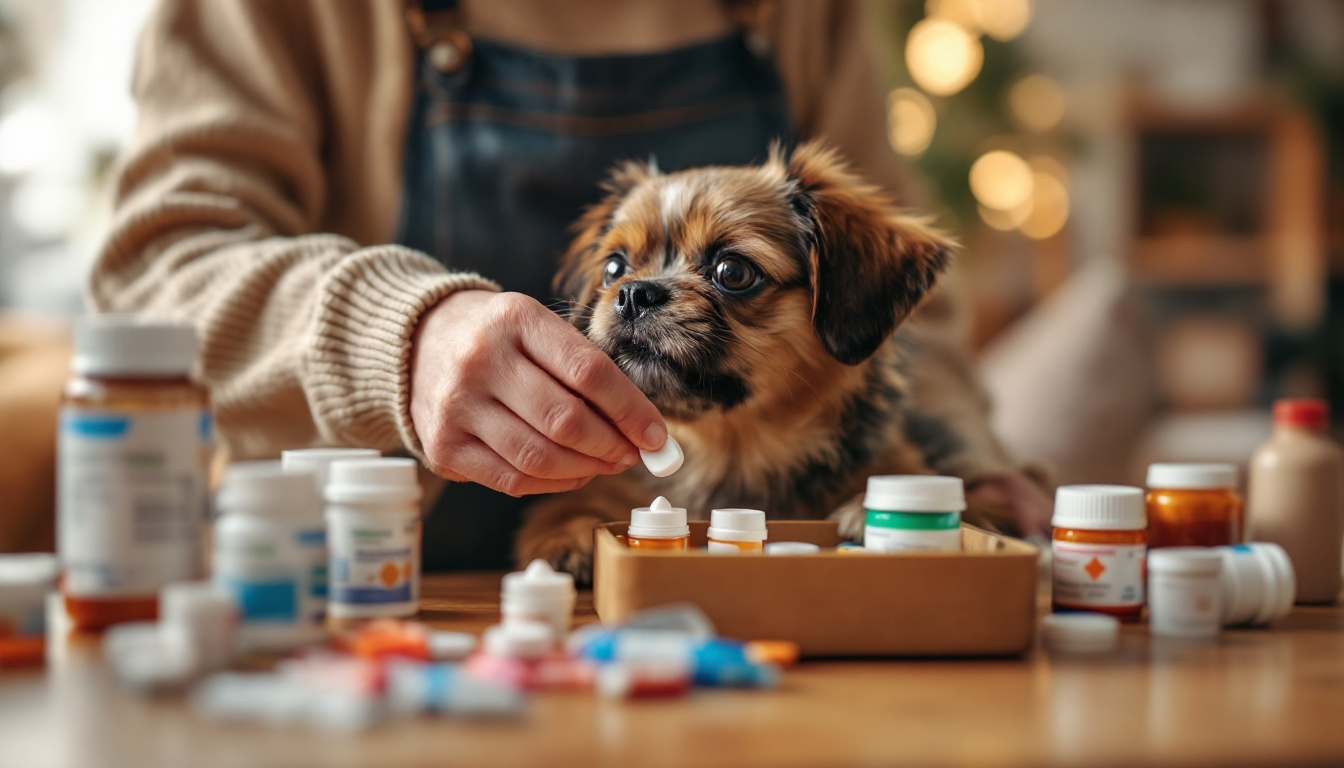Physical Address
304 North Cardinal St.
Dorchester Center, MA 02124
Physical Address
304 North Cardinal St.
Dorchester Center, MA 02124
When a beloved pet falls ill, medications often become a crucial part of their recovery. From flea preventatives to antidepressants, these treatments can dramatically improve quality of life. However, as with any medication, there are potential side effects and risks that pet owners should be aware of. Understanding these risks helps ensure pets receive safe and effective care while minimizing unintended harm.
Recent trends show an increase in medication-related incidents in pets, highlighting the importance of vigilance. For example, calls to the Pet Poison Helpline regarding antidepressant exposures rose by nearly 85% between 2019 and 2022. This surge underscores the need for pet owners to be informed about the medications their animals are taking and the possible side effects.
Just like humans, pets can experience a range of side effects from medications. These can vary from mild to severe and may depend on the type of drug, dosage, and individual sensitivity. Some of the most frequently reported side effects include gastrointestinal upset, lethargy, allergic reactions, and neurological symptoms.

For example, medications like gabapentin, often prescribed for pain and seizures, have been linked to medication errors and side effects in pets. A study reviewing veterinary incident reports found gabapentin among the most frequently involved drugs, with over 10,000 dispensations during the study period. Incorrect dosing was a common issue, contributing to adverse effects. This highlights the importance of precise dosing and monitoring by veterinarians and pet owners alike.
Vaccines and methadone also appeared frequently in error reports, emphasizing that even routine treatments carry risks if not administered correctly. Side effects from vaccines can include mild fever, swelling at the injection site, or more rarely, allergic reactions. Methadone, a strong pain reliever, requires careful dosing to avoid sedation or respiratory issues.
In addition to these common medications, other treatments such as corticosteroids and antibiotics can also lead to significant side effects. Corticosteroids, often used to reduce inflammation, can cause increased thirst and urination, as well as potential behavioral changes in pets. Long-term use can lead to more serious complications, such as diabetes or Cushing’s disease, which necessitates regular veterinary check-ups to monitor the pet’s health. Similarly, antibiotics can disrupt the natural balance of gut bacteria, leading to diarrhea or gastrointestinal discomfort, which can be particularly concerning in young or immunocompromised animals.
Moreover, the interaction between multiple medications can further complicate the side effect profile. Pets on a regimen of several drugs may experience compounded effects or new symptoms that are not easily attributed to a single medication. This underscores the necessity for pet owners to maintain open communication with their veterinarians, providing a complete list of all medications and supplements their pets are taking. By doing so, veterinarians can better assess potential interactions and adjust treatment plans accordingly, ensuring the safety and well-being of our beloved companions.
Some pets have genetic predispositions that make them more vulnerable to certain medications. Cats, for instance, can carry the MDR1 genetic mutation, which significantly increases their risk of serious neurological side effects from drugs containing eprinomectin—a common ingredient in parasite preventatives.
Dr. Katrina Mealey, a veterinarian and pharmacologist, emphasizes the severity of this issue: “Almost every week we receive reports about someone’s pet cat having serious reactions to eprinomectin… we’re trying to increase general awareness of these risks.” Cats with this mutation may experience symptoms ranging from tremors and seizures to more severe neurological damage.
Because of these genetic sensitivities, it’s crucial for pet owners to discuss their pet’s breed and medical history with their veterinarian before starting any new medication, especially parasite control products. Genetic testing can sometimes identify at-risk animals, allowing for safer treatment choices.
In addition to the MDR1 mutation, other genetic factors can also influence how pets metabolize medications. For example, certain breeds may have variations in liver enzymes that affect drug clearance from their systems. This can lead to an accumulation of medications in the body, further increasing the risk of adverse effects. Understanding these genetic nuances is vital for tailoring treatment plans that prioritize the safety and well-being of our furry companions.
Moreover, the landscape of veterinary medicine is evolving with advancements in pharmacogenomics—the study of how genes affect a pet’s response to drugs. This burgeoning field offers exciting possibilities for personalized medicine in veterinary care, allowing veterinarians to prescribe medications that are not only effective but also safe based on a pet’s genetic makeup. As research continues to unfold, it is likely that more genetic markers will be identified, leading to improved outcomes and enhanced safety for pets receiving medical treatments.
Learn more about the risks associated with eprinomectin and genetic sensitivity from recent veterinary research.
Medication errors in veterinary care are a growing concern. A comprehensive study analyzing over 1,000 incident reports found that 66% involved medication-related issues, with incorrect dosing responsible for more than half of these errors. These mistakes can lead to underdosing, reducing effectiveness, or overdosing, which can cause toxicity and severe side effects. The implications of these errors extend beyond immediate health risks; they can also lead to increased veterinary visits, additional treatments, and heightened anxiety for both pets and their owners. The emotional toll on pet owners, who often feel guilt or frustration over these incidents, cannot be overlooked, highlighting the importance of clear communication and education in veterinary practices.
In addition to dosing errors, accidental exposures to human medications pose a significant risk to pets. Antidepressants and antianxiety drugs, for example, have become a leading cause of pet poisonings. The increase in calls to poison control centers reflects how common these accidental ingestions have become, often resulting in neurological symptoms such as agitation, tremors, or seizures. Moreover, the rise in telemedicine and online pharmacies has made it easier for pet owners to access medications without proper guidance, exacerbating the risk of misuse or accidental exposure. This trend underscores the necessity for veterinarians to provide thorough consultations and for pet owners to remain vigilant about the medications they keep at home.
Furthermore, the landscape of pet toxins is evolving. The ASPCA Animal Poison Control Center reported a nearly 5% increase in case volume in 2022 compared to the previous year, with recreational drugs like marijuana-based products and hallucinogenic mushrooms appearing on the list of top pet toxins for the first time. These substances can cause severe and unpredictable reactions in pets, underscoring the need for pet owners to keep all medications and potentially harmful substances securely out of reach. Additionally, common household items such as certain plants, cleaning products, and even human foods like chocolate and grapes are often overlooked as potential hazards. Educating pet owners about these risks is crucial in preventing accidental poisonings and ensuring the safety of their furry companions.
For more details on medication errors and emerging pet toxins, visit the American Animal Hospital Association’s recent report.
While pet medications are designed for animal use, they can sometimes pose health risks to humans as well. Dr. Elaine Blythe, an associate professor of veterinary pharmacology, warns that veterinary drugs can cause effects ranging from mild irritation to life-threatening conditions in people who handle them improperly.
For example, accidental exposure to powerful drugs like methadone or certain antiparasitic agents can be dangerous for pet owners or veterinary staff. This highlights the importance of careful handling, storage, and disposal of pet medications to prevent accidental human exposure. Methadone, often used for pain management in animals, can lead to respiratory depression in humans, while some antiparasitic medications can cause neurological symptoms if ingested or absorbed through the skin. It is crucial for individuals who handle these medications to wear protective gear, such as gloves and masks, to minimize the risk of exposure.
Pet owners should always follow safety instructions provided with medications and consult their veterinarian or pharmacist if they have concerns about handling or potential side effects. Awareness and caution can help protect both pets and their families. Additionally, it is advisable to keep all medications stored securely out of reach of children and pets, as even small doses of certain veterinary medications can be harmful. Regularly reviewing and disposing of expired or unused medications can further reduce the risk of accidental ingestion or exposure.
Moreover, the rise of online pet pharmacies has made it easier for pet owners to access medications, but it also emphasizes the need for education regarding safe practices. Many owners may not be aware of the specific risks associated with certain drugs, leading to unintentional misuse. Engaging in open discussions with veterinarians about the potential hazards of medications can empower pet owners to take proactive measures in safeguarding their health and that of their loved ones. Understanding the implications of veterinary drugs not only enhances pet care but also fosters a safer home environment.
Learn more about veterinary drugs with potential human health hazards from the AAHA’s expert insights.
The pet medications market has seen remarkable growth over the past decade. In 2013 alone, consumers spent $7.6 billion on prescription and over-the-counter medications for dogs and cats. This expansion reflects increased awareness of pet health and willingness to invest in treatments. As pet ownership continues to rise, particularly among millennials who view pets as family members, the demand for high-quality veterinary care and effective medications is expected to increase even further. This trend is not only reshaping consumer spending but also driving innovation within the industry, leading to the development of new formulations and treatment options tailored to specific health needs.
However, with this growth comes the challenge of ensuring medication safety. More products and options mean that pet owners and veterinarians must stay informed about potential side effects and proper usage. The rise in medication-related incidents suggests that education and communication are more important than ever. The complexity of pet medications, including variations in dosages and formulations for different breeds and sizes, necessitates a thorough understanding from both pet owners and healthcare providers. Additionally, the increasing prevalence of online pharmacies and the availability of medications without direct veterinary oversight raise concerns about the potential for misuse and the importance of verifying the legitimacy of sources.
Whether it’s new antidepressants, pain relievers, or parasite preventatives, understanding the risks and benefits of each medication helps safeguard pets’ health. Always consult your veterinarian before starting or changing any treatment, and report any unusual symptoms promptly. Moreover, pet owners should be proactive in discussing their pets’ health history and any other medications their pets are currently taking, as interactions can pose serious risks. Regular follow-ups with the veterinarian can also help monitor the effectiveness of prescribed treatments and make necessary adjustments, ensuring that pets receive the best possible care.
For a deeper look at the pet medications industry and its impact, see the Federal Trade Commission’s detailed report. Additionally, it is crucial for pet owners to stay updated on the latest research and guidelines regarding pet medications, as this knowledge can empower them to make informed decisions about their pets’ health and well-being. Engaging with community resources, such as local veterinary clinics and pet health seminars, can provide valuable insights into safe medication practices and emerging trends in the pet care industry.
Ensuring your pet’s safety while using medications involves several key steps:

By staying informed and proactive, pet owners can help minimize risks and ensure their furry friends receive the best possible care.
Medications play an essential role in maintaining and improving pet health, but they are not without risks. Side effects, genetic sensitivities, medication errors, and accidental poisonings are all important considerations for pet owners and veterinarians alike. Recent data reveals a worrying increase in medication-related incidents, especially involving antidepressants and emerging toxins.

Being aware of these risks, following veterinary instructions carefully, and maintaining open communication with your pet’s healthcare provider are the best ways to protect your pet. With the right knowledge and precautions, medications can be used safely to support your pet’s health and happiness for years to come.
As our cherished companions enter their senior years, managing medications becomes increasingly important to their well-being. At CaringForOldPets, we understand the unique challenges of caring for aging dogs and cats. Our expert-approved tips and strategies are tailored to help you navigate the complexities of pet medications and enhance your senior pet’s quality of life. Learn More about how to support your pet through their golden years with our dedicated resources.